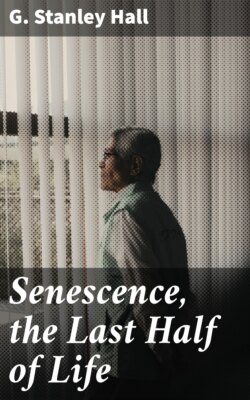Читать книгу Senescence, the Last Half of Life - G. Stanley Hall - Страница 9
На сайте Литреса книга снята с продажи.
ОглавлениеJonathan Swift76 describes the Struldbruggs or immortals whom he met in a far country. They were distinguished by being born with a red circle over the left eye, which changed in color and grew in size with age. These beings, he thought, must be a great blessing, and he described to those who had first told him of them what he would do were it his great good fortune to be born a Struldbrugg. First of all, he would amass wealth so that in two hundred years he would be the richest man in the realm. Next he would apply himself to learning, which in the course of time would make him wisest of all men. Then he would note all events and become a living treasury of knowledge and the oracle of the nation. He would be able to warn rising generations against all impending evils and thus prevent degeneration.
Having heard his ideals, he was told that in fact the state of these immortals was very different; indeed, so pitiful was it that their example mitigated the universal desire to live, so that death was no longer the greatest evil but, on the contrary, undue prolongation of life was a far greater one. The Struldbruggs acted like mortals till about thirty, then grew melancholy until four-score, when they had “not only the follies and infirmities of other old men but had many more which arose from the dreadful prospects of never dying.” “They were not only opinionative, peevish, morose, vain, talkative, but incapable of friendship and dead to all natural affection, which never descended below their grandchildren.” “Envy and impotent desires are their prevailing passion, but the objects against which their envy seems principally directed are the vices of the younger sort and the deaths of the old. By reflecting on the former they find themselves cut off from all possibility of pleasure, and whenever they see a funeral they lament and repine that others are gone to a harbor of rest to which they themselves can never hope to arrive.” “They have no remembrance of anything but what they learned and observed in their youth and middle age and even that is very imperfect, and for the truth or particulars of any fact it is safer to depend on the common traditions than upon their best recollections.” “The less miserable among them appear to be those who turn to dotage and entirely lose their memories; they meet with more pity and assistance because they lack many bad qualities which abound in others.” If they marry one of their own kind, the marriage is dissolved as soon as the younger comes to be four-score, for they “should not have their misery doubled by the load of a wife.”
“As soon as they have completed the term of eighty years they are looked on as dead in law; their heirs immediately succeed to their estates, only a small pittance being reserved for their support, and the poor ones are maintained at the public charge. After that period they are held incapable of any employment of trust or privilege, cannot purchase land or take leases; neither are they allowed to be witnesses in any cause either civil or criminal.” “At ninety they lose their teeth and hair, they have at that age no distinction of taste but eat and drink whatever they can get, without relish or appetite.” In talking, they forget the common appellation of things and the names of persons, even of those who are their nearest friends and relatives. “For the same reason they can never amuse themselves with reading because their memory will not serve to carry them from the beginning of a sentence to the end. The language of the country, too, is slowly undergoing a change so that the Struldbruggs of one age do not understand those of another but live like foreigners in their own country.” They are despised and hated by all sorts of people. When one of them is born it is reckoned ominous and the birth is recorded very particularly, but in general the record is lost after a thousand years. “They were the most mortifying sight I ever beheld, and the women were more horrible than the men. Besides the usual deformities in extreme old age, they acquired an additional ghastliness in proportion to their number of years.”
Thus from what the author saw and heard, his keen appetite for perpetuity of life was much abated and he realized that there was no form of death to which he would not run with pleasure in order to escape such a life. He concludes that it is fortunate that his desire of taking specimens of these people to his own country was forbidden by law, and reflects that their maintenance might prove a grievous public charge, for since “avarice is the necessary consequent of old age, these immortals would, in time, become proprietors of the whole nation and engross the civil power, which a want of abilities to manage must end in the ruin of the public.”
